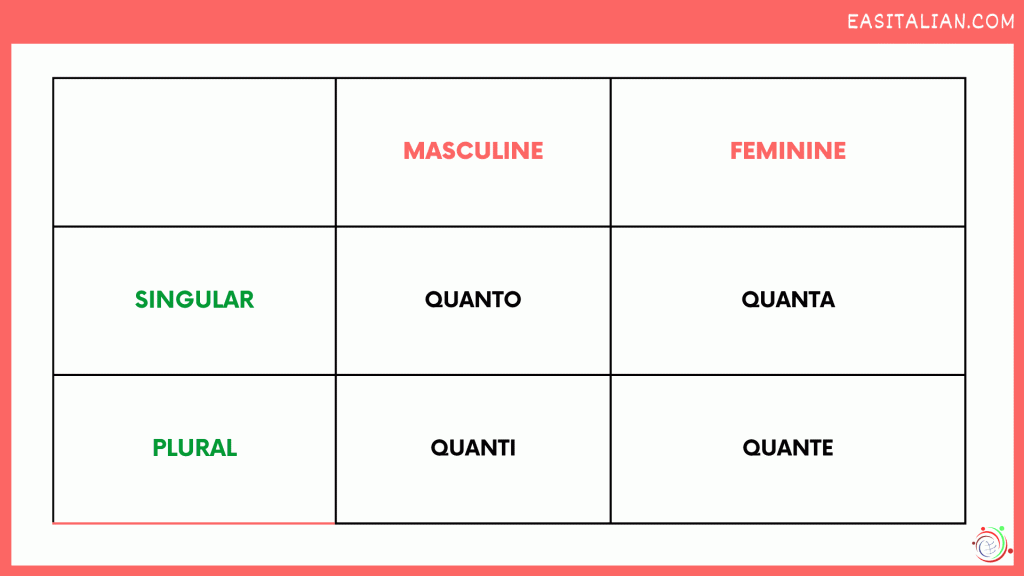The most common way of asking questions in Italian using ‘question words’. Find out and learn in this post Asking questions in Italian using question words.
Question words are placed at the beginning of the sentence they introduce.
1. Chi? (Who/Whom)
Chi means ‘who/whom’, or sometimes ‘which of’, and is only used to refer to people: is always used as a relative pronoun to refer to people, never to things.
Chi is invariable – that is, the same form is used for masculine and feminine, singular and plural:
When an adjective refers to chi, it must be in the masculine singular form unless it refers to an all-female group:

2. Che cosa? Cosa? Che? (What)
All three mean ‘what’ and are used when referring to objects.
It is the most general term of the Italian interrogative, referring to almost anything that exists in a material or ideal sense.
Che cosa?, Cosa? and Che? are invariable in gender and number:
Che is also used as an adjective meaning ‘what (sort/type of)’:
3. Come?(How
Come means ‘how’:
It means “how/in what way?” and may be used in direct or indirect sentences:
Come ti chiami?( what’s your name?);
Come sta tuo padre? (how’s your father?);
Come can sometimes mean ‘what’, as in Come dici? (What did you say?),
Com’è Edimburgo/il nuovo professore? (What’s Edinburgh/the new teacher like?).
Come mai has a similar meaning, corresponding to the English ‘how come’:
📌 When used with MAI or with é (verb essere) means “per quale ragione” (for what reason)
In particular,
Come mai non l’hai saputo? (How come you didn’t know?)Non capisco come mai tardi tanto. (not sure why it’s so late.)
Com’è che …? (how is it that…?)
Com’è che non ti fai più vivo? (How come you don’t show up anymore?)
4. Dove? (Where)
Dove means ‘where’.
It is used to ask about or identify a location.
Da dove…? specifies the point of origin.
Da dove vieni? Da Milano. (Where are you from? I’m from Milan.)

5. Quando? (When)
Quando means ‘when’
It is used as an adverb in interrogative phrases to ask when or where a specific action, event, or situation happened or will happen.
6. Perché? (Why)
Perché means ‘why’:
It is used as an adverb in interrogative phrases to ask why a fact, an action, or a situation happens or does not happen.
7. Quanto? (How much/long
Quanto means ‘how much’ when referring to quantity, and “how long”, ‘how far’, ‘how tall’, etc. when it refers to time, distance, height, etc.:
Quanto can also be used as an adjective or pronoun.
In such contexts, it agrees with the noun it refers to in gender and number:
quanto [ms], quanta [fs] (how much),
quanti [mp], quante [fp] (how many)


8. Quale? (Which)
Quale means ‘which’ (or sometimes ‘what’).
It is used either as an adjective or as a pronoun, and therefore agrees with the noun it refers to:
quale, ‘which (one)’, quali, ‘which (ones)’.
The use of “quale” rather than “che” usually implies that there is a choice, for example, if there are some books lying on the table:
Quale libro leggi? ‘Which book are you reading?’:
Qual (without an apostrophe) is used before the forms of “essere” starting with a vowel; used in this way, it sometimes means ‘what’ rather than ‘which’.


What’s next?
You might want to keep learning Italian online with these free resources:









Leave a Reply